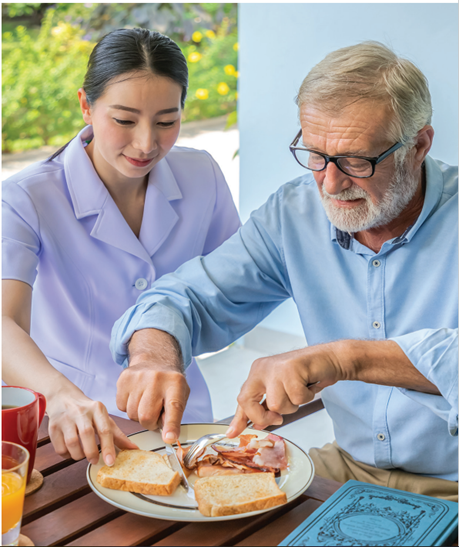 Whether it’s to stay healthy, in social gatherings with friends, or as an expression of our creativity, food is central to our days and happiness. Most people have food-related stories about their social events or holidays. However, as we age, sometimes that joy is diminished by our body’s decreased capacity to intake nutrients, mechanical issues with chewing and digestion, and a declining sense of taste.
Whether it’s to stay healthy, in social gatherings with friends, or as an expression of our creativity, food is central to our days and happiness. Most people have food-related stories about their social events or holidays. However, as we age, sometimes that joy is diminished by our body’s decreased capacity to intake nutrients, mechanical issues with chewing and digestion, and a declining sense of taste.
When eating is no longer enjoyable, it can be tempting to skip eating or to choose foods that are quick and easier to prepare. Unfortunately, our loved ones do not have the luxury of pursuing these simpler, and less healthy, choices while maintaining their health. Malnutrition is a gateway to weakness, loss of muscle strength, wounds that don’t heal as quickly, and reduced mental capacity. One study noted that over 43% of older patients admitted to intensive care were malnourished and that they were more likely to have complications and longer hospital stays than other patients.
If you  do not live nearby or do not have the luxury of time to monitor your loved ones’ eating habits, it is worth looking into HomeSpark, in-home senior care services. We offer a wide range of services, including shopping for healthy and appealing ingredients, meal preparation and the social component of companionship to encourage your loved ones to eat. Our Family Room Portal allows family members to view notes from caregivers, so you can see what meals and snacks are served and how well your loved ones' are eating.
do not live nearby or do not have the luxury of time to monitor your loved ones’ eating habits, it is worth looking into HomeSpark, in-home senior care services. We offer a wide range of services, including shopping for healthy and appealing ingredients, meal preparation and the social component of companionship to encourage your loved ones to eat. Our Family Room Portal allows family members to view notes from caregivers, so you can see what meals and snacks are served and how well your loved ones' are eating.
In order to stay ahead of malnutrition challenges, encourage your older adult to follow these guidelines:
- Eat whole foods that offer a lot of nutrients without extra calories such as brightly colored fruits and vegetables, whole grains, dairy with added vitamin D and calcium, seafood and lean meats, eggs, beans nuts and seeds.
- Avoid foods with empty calories such as those that are highly processed as well as soda and alcohol.
- Choose foods that are lower in fat and not fried.
- Drink plenty of liquids, especially water.
- Reduce salt consumption and increase spices that add flavor to the foods.
- Increase exercise of any kind as it can work to stimulate appetite.
If your loved one simply has a small appetite, you can help them add calories and nutrition without adding bulk by introducing sauces or gravies and/or grated cheese to dishes. Stirring powdered milk into dishes can add calcium. Adding honey, molasses or maple syrup to their breakfast cereal can help raise their blood sugar. Adding wheat germ to cereals and baked goods can increase the nutritional value without adding bulk. Additionally, consider suggesting more small meals during the day instead of a couple of larger ones that can be overwhelming to both prepare and to eat. It helps to make sure that your loved one is following a regular schedule for meals so that it is as simple as looking at a clock to know that it is time to eat. If they don’t remember to look at clocks, find a calendar or app that will sound an alarm for breakfast, lunch, snacks and dinner. Also, encourage them to find a friend or neighbor to share meals with several times a week. Social eating can be an encouragement to stay healthy.
